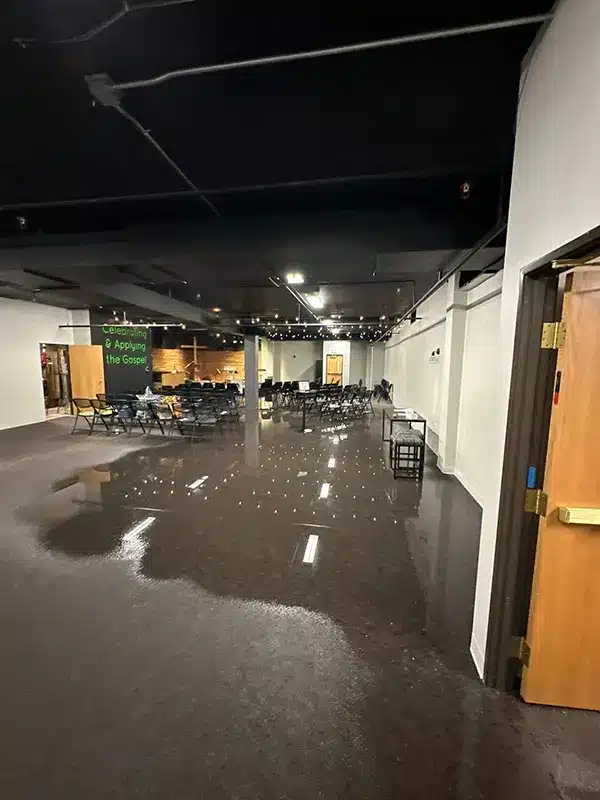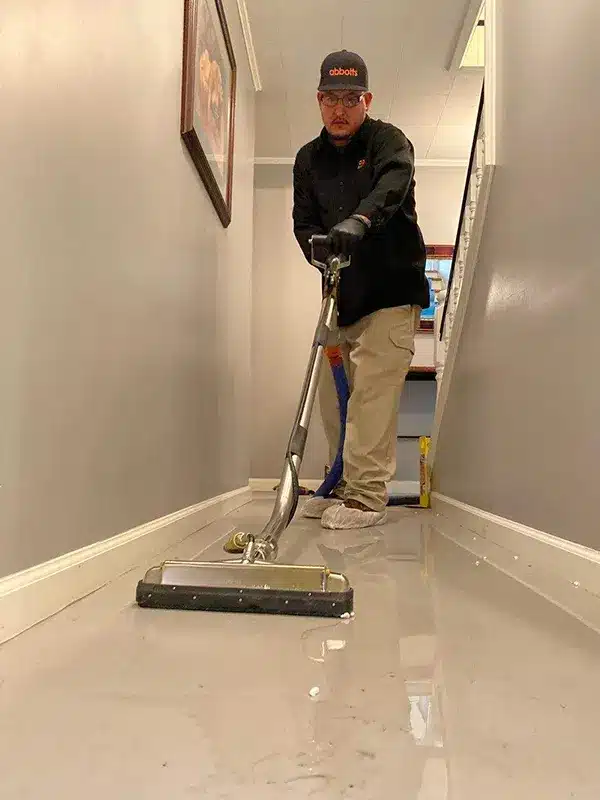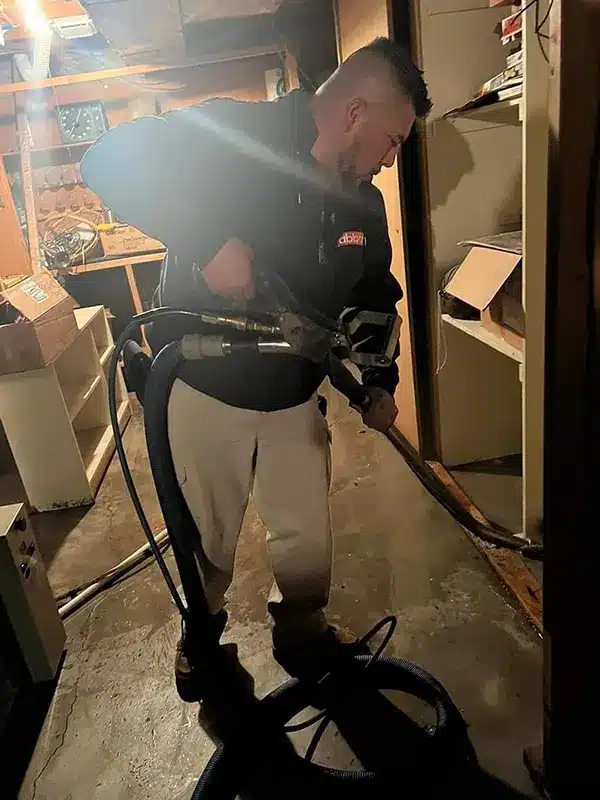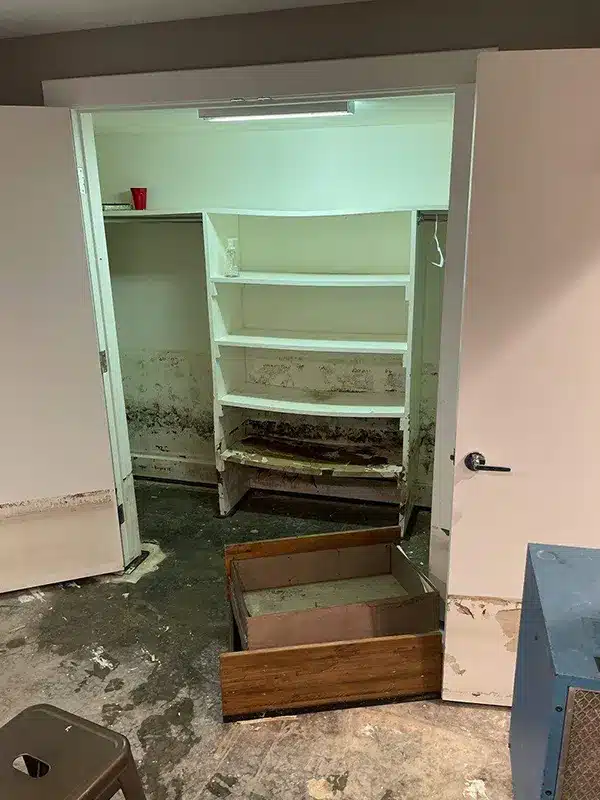WATER HEATER DAMAGE
Our Denver water damage cleanup experts have the equipment, personnel and know-how to address water damage from leaking water heaters.
Abbotts Cleanup & Restoration

Services
- P24 / 7 Emergency Response
- PWater Extraction & Drying
- PDehumidification
- PContent Moving & Storage
- PProperty Cleanup
- PSewage Cleanup
- PDecontamination
- PProperty Restoration
- PInsurance Claim Management
- POne Year Warranty
- PFinancing Options
Do I need professional water heater flood restoration services?
Water heaters can hold as much as 50 gallons which will cause you major headaches! Even a small water heater leak can cause big problems to floors, subfloors and walls. Water can destroy your property in a short time. It takes less than 24 hours clean water to start creating mold spores. Unsightly and malodorous, mold also creates allergic reactions and respiratory problems in some individuals.
How can I prevent further water heater flood damage?
- To get started, turn off power to the area. Electricity and water – even a small amount of water from a leaking hot water tank – are a dangerous combination. Turning off power will prevent electrical shock while you clean up the water heater leak.
- Then, turn off the water supply. If you cannot easily reach the water heater shut-off valve, then turn off the main water supply to prevent further water damage. Depending on the nature of the hot water tank leak, water within the tank may continue to flood.
- Immediately soak up standing water. You can use towels or a mop to soak up standing water. Water extraction equipment and air movers (like fans) may be necessary to ensure all the moisture from the leaking hot water tank is removed. Act quickly! Time is of the essence to prevent additional water damage or mold damage.
When you have your water heater leak under control, you need to either repair or replace the hot water tank so it does not continue to flood your property. A water heater leak does not go way, it will only get worse. Temperature & pressure relief valves, water inlets, drain valves and the internal tank are common places where a hot water tank leak will originate. Hot water tanks leaks from the temperature & pressure relief valve (T&P valve) may be caused by excessive pressure inside the tank or overheating. This pressure on the T&P valve will keep it open almost continuously, leading to your water heater leaking. Before replacing the T&P valve you’ll need to drain your hot water tank.
Water can destroy your property in a short time. The sooner the water heater flood damage is dried, cleaned and restored, the lower your risk for hazardous mold growth. Depending on the amount of water from your water heater flood, you may need professional equipment. Abbotts can be on-site within 60 minutes.
We work with ALL insurance providers.




How should I select a Denver Water Damage Restoration Company?
Water damage from water heater leaks require a swift response. High humidity creates optimal conditions for mold to begin growing in less than 24 hours. A good water damage restoration company will offer immediate response 24 hours a day, 7 days a week.
Hot water tanks hold up to 50 gallons of water. A substantial leak can poor hundreds gallons of water an hour into your home! That much water from a water heater flood can cause a lot of damage if not thoroughly dried.
Find a Professional Water Damage Restoration Company
A reputable water damage restoration company will do the best work, saving you from having to spend money on equipment and supplies to clean up the water heater flood damage. They will also save you additional money on expensive repairs down the road if moisture is not completely removed. Look for a water damage restoration company that offers free inspections and detailed estimates using industry-specific estimating software, too.
Water heater tanks hold up to 50 gallons of water. Damage from a leaking water heater can be significant if not thoroughly dried.


Start with Trust
Highly Regarded
Look for a Denver water damage cleanup services company who is highly regarded and has a solid reputation. Online reviews are a great resource to help you locate professional cleanup & restoration companies.
Reputation
Look for a water cleanup services company who is highly regarded and has a solid reputation. While word of mouth is still one of the best indicators, online reviews are great option to locate quality water damage cleanup and restoration professionals. A quick check with the Denver Better Business Bureau is always a good idea, too.
Common Causes of Water Damage
What is the Water Damage Restoration Process?
The cleanup from a water heater leak can be complicated. Standing water, humidity, contaminants, and mold growth are all considerations when developing a water damage restoration response plan. The water damage restoration process involves removing water, drying the structure and contents then fixing damage caused by the water. Water damage restoration professionals like Abbotts know how to get you back to normal quickly.
How does the water heater flood damage restoration process work?
- Detailed inspection of the water damage from the leaking water heater
- High-tech infrared cameras and moisture meters determine extent of water damage from the water heater leak
- Water extraction, drying systems and dehumidification units put into place
- Additional water damage cleanup including decontamination, anti-microbials and sanitizers.
After the damage mitigation from the water heater leak and the cleanup is complete, detailed estimates are prepared for the reconstruction and restoration including structural and cosmetic repairs to your building such as the roof, walls, ceiling, and/or flooring.
Answering Your Water Damage Restoration Questions
How much does it cost for water damage restoration?
Average water damage restoration costs range from $2000 to $5000. This includes water extraction and drying as well as repairs to ceiling and walls resulting from the water damage.
How long does it take to repair water damage?
The length of time it takes to repair water damage depends on a variety of factors including how much water there is and what kind of material is impacted. Once the water is extracted, drying equipment like air movers and dehumidifiers are installed. For small areas with clean water, the entire process is usually completed in just a few days. For larger areas or contaminated water, it can take several weeks, even months, to get you back to normal.
What causes water damage?
Water damage results from an excessive amount of water. Common causes of water damage include broken pipes, frozen pipes, broken sprinklers, leaking appliances, toilet overflow, sump pump failure, clogged gutters, rain water, roof leak, foundation leak, basement leak, attic leak, HVAC leak, and floods. The longer water sits, the more damage it will cause.

Need an expert?
Abbotts is standing by 24/7 to help with your water damage emergency.
The company of choice for property damage restoration

Monthly Payment Options
60 second pre-qualification. Does not affect your credit score




























































